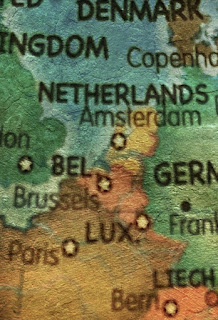READ
The book I selected for the Netherlands, The
Following Story, written by Cees Nooteboom and translated by Ina Rilke,
was something of a departure from the types of books I usually read. It is the
story of a man who went to bed in Amsterdam, and woke up the next morning in a
hotel room in Lisbon, Portugal.
How could that be? The man in question, Herman Mussert, doesn’t understand how it happened either. “I had waked up with the ridiculous feeling that I might be dead, but whether I was actually dead, or had been dead, or vice versa, I could not ascertain.” As he takes in his surroundings, he realizes that he has been in this room before. In fact, he has been in this very bed before with the wife of another man.
Mussert is a bachelor living in Amsterdam, and a writer of travel guides under the pseudonym Dr. Strabo. He is a classical scholar, working on a translation of Ovid’s Metamorphoses in his spare time. But the book takes the reader back twenty years, to a time when Mussert teaches Latin and Greek in a Lisbon school. He is a popular teacher, nicknamed Socrates, and is happy in his work.
There is a student in the school, Lisa d’India, who is everyone’s favorite. Not only is she beautiful, but she is good in every subject. According to Mussert, he is the only person in the entire school who is not in love with Lisa, although he cherishes her as a student. Things begin to unravel for Mussert when one of the teachers, Arend Herfst, who is married to another teacher at the school, Maria Zeinstra, begins an affair with Lisa.
Mostly to spite her husband, Maria Zeinstra decides to have an affair with Mussert. She is the only woman whom Mussert will ever love, but things end badly for everyone.
At one point, Mussert muses that maybe he’s back in Lisbon on a sort of pilgrimage and must visit “all the stations where the past had a face.” He finds himself aboard a ship with an interesting assortment of passengers, including a priest who always hated hearing confession (“And they kept coming back, and one kept being forced to forgive them.”)
Being of a more literal bent, I had a hard time figuring out what was going on during this voyage, or, for that matter, in many parts of the book. The plot occupies a sort of twilight zone between life and death, with Mussert as the hapless soul trying to make sense of his metamorphosis.
COOK
I didn’t get any help coming up with food ideas from The
Following Story. Mussert’s style of eating is “opening a can of beans.”
So I went to the Internet and found a recipe for a vegan version of a
traditional Dutch dish called stamppot, which
consists of mashed potatoes, cabbage, and sausage. The recipe I found on the My
Green Passion website called for seasoned tempeh instead of sausage. Since I’m
not a fan of tempeh, I decided to use Beyond
Sausage Brats. It turned out well – I even had seconds! Good thing, since the
recipe made a huge batch, and I’ll be eating it for days.
GIVE
I didn’t find any climate-related projects that interested me
on the GlobalGiving website, so I turned to Google instead and found Milieudefensie,
a Friends of the Earth organization located in Amsterdam. According to their
website: “Our mission is a good life for all people on earth and for
generations to come. For this mission, a safe and healthy environment is
needed, a just distribution of and access to the natural wealth of the earth,
respect for nature and a voice for people on how to manage these. We choose
just solutions – solutions without adverse effects for the Global South or for
generations to come, and which can involve more people in our own country and
create jobs and opportunities for everyone.” They have been very active in
campaigns and lawsuits against Shell, and in creating pressure against other
large polluting companies.
More information about Milieudefensie is available at A good life for all people on earth and for generations to come — Milieudefensie.
NEXT STOP: NEW ZEALAND





